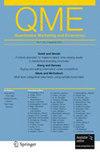You get what you give: theory and evidence of reciprocity in the sharing economy
IF 1.1
4区 管理学
Q3 BUSINESS
引用次数: 74
Abstract
We develop an analytical framework of peer interaction in the sharing economy that incorporates reciprocity, the tendency to increase (decrease) effort in response to others’ increased (decreased) effort. In our model, buyers (sellers) can induce sellers (buyers) to exert more effort by behaving well themselves. We demonstrate that this joint increased effort can improve the utility of both parties and influence the market equilibrium. We also show that bilateral reputation systems, which allow both buyers and sellers to review each other, are more responsive to reciprocity than unilateral reputation systems. By rewarding reciprocal behavior, bilateral reputation systems generate trust among strangers and informally regulate their behavior. We test the predictions of our model using data from Airbnb, a popular peer-to-peer accommodation platform. We show that Airbnb hosts that are more reciprocal receive higher ratings and that higher rated hosts can increase their prices. Therefore, reciprocity affects equilibrium prices on Airbnb through its impact on ratings, as predicted by our analytical framework.一分耕耘,一分收获:共享经济中互惠的理论与证据
我们开发了一个共享经济中同伴互动的分析框架,该框架包含互惠,即增加(减少)努力以回应他人增加(降低)努力的趋势。在我们的模型中,买家(卖家)可以通过表现良好来诱导卖家(买家)付出更多的努力。我们证明,这种共同增加的努力可以提高双方的效用,并影响市场均衡。我们还表明,允许买卖双方相互审查的双边声誉体系比单边声誉体系更能对互惠做出反应。通过奖励互惠行为,双边声誉系统在陌生人之间产生信任,并非正式地规范他们的行为。我们使用流行的对等住宿平台Airbnb的数据来测试我们模型的预测。我们发现,更互惠的Airbnb房东会获得更高的评级,而评级更高的房东可以提高价格。因此,正如我们的分析框架所预测的那样,互惠通过对评级的影响来影响Airbnb的均衡价格。
本文章由计算机程序翻译,如有差异,请以英文原文为准。
求助全文
约1分钟内获得全文
求助全文
来源期刊

Qme-Quantitative Marketing and Economics
Multiple-
CiteScore
2.30
自引率
10.50%
发文量
13
期刊介绍:
Quantitative Marketing and Economics (QME) publishes research in the intersection of Marketing, Economics and Statistics. Our focus is on important applied problems of relevance to marketing using a quantitative approach. We define marketing broadly as the study of the interface between firms, competitors and consumers. This includes but is not limited to consumer preferences, consumer demand and decision-making, strategic interaction of firms, pricing, promotion, targeting, product design/positioning, and channel issues. We embrace a wide variety of research methods including applied economic theory, econometrics and statistical methods. Empirical research using primary, secondary or experimental data is also encouraged. Officially cited as: Quant Mark Econ
 求助内容:
求助内容: 应助结果提醒方式:
应助结果提醒方式:


